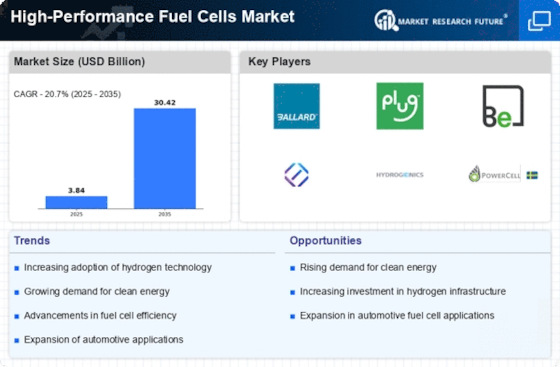Top Industry Leaders in the High Performance Fuel Cells Market

*Disclaimer: List of key companies in no particular order
Top listed companies in the High-Performance Fuel Cells industry are:
Ballard Power Systems (Canada)
Hydrogenics (Canada)
Toshiba Energy Systems & Solutions Corporation (Japan)
SFC Energy (Germany)
Mitsubishi Hitachi Power Systems (Japan)
Ceres Power (UK)
Horizon Fuel Cell Technologies (Singapore)
Aisin Seiki Co. (Japan)
Kyocera (Japan)
AFC Energy (UK)
Altergy (US)
Nuvera Fuel Cells LLC (US)
Powering the Future: Navigating the Competitive Landscape of High-Performance Fuel Cells
Beyond the hum of conventional engines, a cleaner and more efficient future flickers – the competitive landscape of the high-performance fuel cell market. This multi-billion dollar ecosystem crackles with activity, as established giants, nimble pioneers, and regional champions vie for a share in powering transportation, stationary applications, and remote locations with hydrogen-fueled electricity. Let's delve into the key strategies, market dynamics, and future trends shaping this electrifying space.
Key Player Strategies:
Global Titans: Companies like Bloom Energy, Cummins, and Plug Power leverage their extensive experience, diverse product portfolios, and global reach to maintain their dominance. They cater to major players in transportation, industries, and utilities, offering high-performance fuel cells for heavy-duty vehicles, stationary power generation, and off-grid applications. Bloom Energy's ServerGen fuel cells exemplify their focus on large-scale, stationary power solutions.
Technology Disruptors: Startups like SolidEnergy Systems and American Fuel Cell Corporation are disrupting the market with next-generation technologies like solid-state electrolytes, high-temperature PEMCs, and compact fuel cell stacks. They cater to high-tech customers and niche applications, offering improved efficiency, durability, and power density. American Fuel Cell Corporation's PEM Power Packs showcase their focus on portable and versatile fuel cell solutions.
Cost-Competitive Challengers: Chinese manufacturers like Guangdong Huaneng Clean Energy Technology and Beijing Sungrow Power Supply Co. are making waves with competitively priced fuel cells, targeting cost-conscious buyers in emerging markets. They focus on affordability and basic functionality, offering alternatives to premium brands. Guangdong Huaneng's PEM fuel cells demonstrate their focus on cost-competitive solutions for stationary power applications.
Niche Specialists: Companies like Proton OnSite and Exergy Solutions excel in specific segments like fuel cells for backup power, microgrids, and remote telemetry systems. They leverage deep understanding of niche requirements and offer tailored solutions for specific operating conditions and energy needs. Proton OnSite's HERC fuel cells exemplify their focus on rugged and reliable solutions for backup power and critical infrastructure.
Factors for Market Share Analysis:
Power Density and Efficiency: Offering fuel cells with high power outputs per unit volume and weight, maximizing fuel utilization, and minimizing energy losses is crucial. Companies with efficient and powerful fuel cells gain an edge.
Durability and Reliability: Ensuring fuel cells last for extended periods with minimal maintenance requirements and operate reliably in diverse environments is paramount. Companies with robust and durable solutions stand out.
Hydrogen Infrastructure and Availability: Building partnerships with hydrogen suppliers, supporting the development of fueling infrastructure, and offering hydrogen production and storage solutions can create a competitive advantage. Companies actively shaping the hydrogen ecosystem gain an edge.
Cost and Affordability: Balancing advanced features with competitive pricing, offering flexible financing options, and reducing installation costs caters to diverse customer needs and project feasibility. Companies providing cost-effective solutions gain market share.
New and Emerging Trends:
Focus on Solid-State Fuel Cells: Utilizing solid electrolytes instead of liquid membranes enhances durability, safety, and operating temperature range, opening up new application possibilities. Companies leading in solid-state technology attract premium pricing and access to diverse markets.
High-Temperature PEMCs: Developing PEM fuel cells that operate at higher temperatures improves efficiency and compatibility with waste heat recovery systems, making them even more attractive for industrial applications. Companies pioneering high-temperature PEMCs gain an edge in energy-intensive sectors.
Miniaturization and Portability: Developing compact and lightweight fuel cell stacks facilitates integration into smaller devices and portable applications, expanding market reach beyond traditional segments. Companies leading in miniaturization attract diverse customers and new use cases.
Integration with Renewable Energy Sources: Pairing fuel cells with solar, wind, or biomass energy production creates self-sufficient and sustainable power solutions, particularly appealing in off-grid and remote locations. Companies offering integrated solutions attract environmentally conscious customers and regulatory benefits.
Overall Competitive Scenario:
The high-performance fuel cell market is a dynamic and complex space with diverse players employing varied strategies. Established giants leverage their reach and diverse portfolios, while technology disruptors introduce innovative solutions. Cost-competitive challengers cater to budget-conscious buyers, and niche specialists excel in specific applications. Factors like power density, durability, hydrogen infrastructure, and cost play a crucial role in market share analysis. New trends like solid-state technology, high-temperature PEMCs, miniaturization, and renewable energy integration offer exciting growth opportunities. To succeed in this evolving market, players must prioritize innovation, cater to diverse customer needs, embrace sustainable practices, and explore technology-driven solutions. By powering the future with clean and efficient hydrogen-fueled electricity, they can secure a dominant position in this transformative market.
Latest Company Updates:
Ballard Power Systems (Canada): December 2023: Announced a multi-million dollar contract with a major European truck manufacturer to supply fuel cell modules for heavy-duty trucks (Source: Ballard Power Systems press release).
Hydrogenics (Canada): December 2023: Acquired by Cummins Inc. for $2.9 billion to expand its hydrogen fuel cell offerings (Source: Cummins Inc. press release).
Toshiba Energy Systems & Solutions Corporation (Japan): December 2023: Successfully demonstrated a 10 MW solid oxide fuel cell (SOFC) system for stationary power generation (Source: Toshiba Energy Systems press release).
SFC Energy (Germany): December 2023: Secured a €10 million order for its EFOY hydrogen fuel cell power generators for off-grid applications (Source: SFC Energy press release).
Mitsubishi Hitachi Power Systems (Japan): December 2023: Completed construction of a 50 MW hydrogen fuel cell demonstration facility in Hiroshima, Japan (Source: Mitsubishi Hitachi Power Systems press release).










